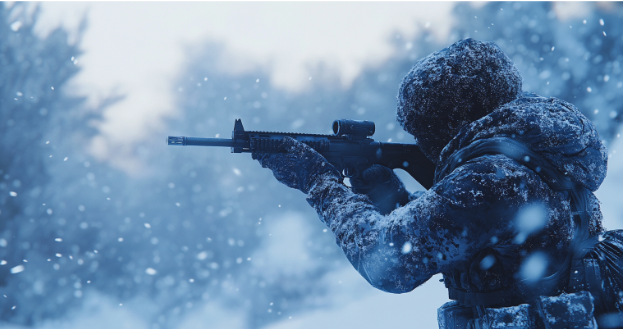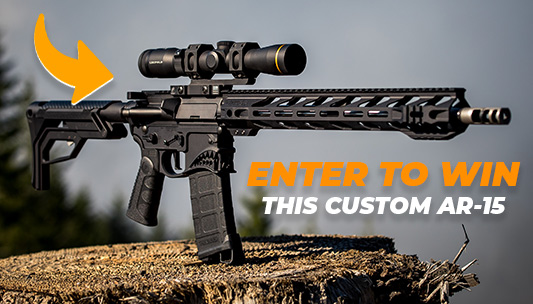Shooting
Cold Weather Shooting: How Winter Affects Your Performance
Published
3 hours agoon
By
Gun Carrier
When temperatures drop, outdoor shooting becomes more demanding. Cold weather shooting presents challenges like stiff fingers, equipment malfunctions, and altered ballistics. Because of this, winter range days require thoughtful preparation and specific strategies to ensure success.
That said, cold weather doesn’t have to stop your progress. You can adapt and improve if you apply the right mindset, gear, and techniques. In this guide, we’ll explore the impact of cold weather on shooting and how to address these challenges effectively.
How Cold Weather Affects Shooting Performance
Shooting in the cold impacts your accuracy, comfort, and equipment. Understanding these effects is the first step in overcoming them.
1. Stiff Fingers and Reduced Dexterity
Cold temperatures often leave your fingers stiff and less responsive. As a result, gripping your firearm securely or reloading quickly can become difficult.
2. Changes in Ballistics
Cold air is denser than warm air, which slows bullets and slightly alters their trajectory. Consequently, long-range shooters may notice a greater drop in bullet flight. As such, precision adjustments are necessary to maintain accuracy.
3. Equipment Malfunctions
Standard lubricants can thicken or freeze in low temperatures, causing your firearm to jam. Additionally, batteries in optics and rangefinders drain faster in the cold, which can leave you without essential tools mid-session.
4. Comfort and Focus
Cold weather affects your body as well. Shivering or numbness can disrupt your aim, stance, and breathing. This makes staying warm a critical part of maintaining focus and consistency.
For more tips on handling firearms in extreme conditions, visit the National Shooting Sports Foundation.
Cold Weather Shooting Tips
Despite the challenges, you can succeed in cold weather shooting by preparing properly. Here are some key tips to help you stay effective:
1. Dress for Warmth and Flexibility
- Wear Layers: Start with a moisture-wicking base layer, add an insulating layer, and finish with a windproof outer shell.
- Choose Shooting Gloves: Thin, insulated gloves keep your hands warm without reducing dexterity.
- Don’t Forget Extremities: Thermal socks, sturdy boots, and a beanie are essential to prevent heat loss.
2. Prepare Your Equipment
- Use cold-weather lubricants to keep your firearm functioning smoothly.
- Carry extra batteries for optics and electronics. Keep them in a warm pocket to prolong their lives.
- Re-zero your firearm in cold conditions. This helps adjust for changes in bullet trajectory due to the dense air.
For detailed equipment recommendations, visit Pew Pew Tactical.
3. Stay Warm During Breaks
Take short breaks between shooting sessions to warm up. For example, head indoors or near a heat source. Drinking warm liquids like tea or coffee keeps your energy and body hydrated.
Adapting Your Technique
In cold weather, small mistakes can quickly compound. Adapting your shooting technique ensures better control and accuracy despite the conditions.
1. Maintain a Firm Grip
Cold fingers weaken grip strength, which can affect your control over recoil. To counteract this, focus on holding your firearm securely with consistent pressure.
2. Slow Down Movements
Quick actions, like transitioning between targets or reloading, may cause errors in the cold. Instead, move deliberately and focus on precise, controlled motions.
3. Control the Trigger
Stiff fingers often lead to jerky trigger pulls, throwing off your shot. To avoid this, practice slow, steady presses to maintain accuracy.
For more advice on shooting techniques in all conditions, visit USCCA.
Common Mistakes to Avoid
To make the most of your winter shooting sessions, steer clear of these common errors:
- Wearing Too Much Bulk: While layers are essential, overly thick clothing can limit movement. Choose fitted, flexible layers designed for outdoor activity.
- Skipping Maintenance: Moisture from snow or condensation can lead to rust. Clean and dry your firearm after every session to keep it in top condition.
- Ignoring Safety: Snow and ice can make the range floor slippery. Wear boots with good traction to prevent accidents.
By avoiding these mistakes, you’ll improve both safety and performance during cold weather shooting.
Benefits of Cold Weather Shooting
Although challenging, winter shooting builds resilience and sharpens your focus. Practicing in difficult conditions forces you to pay closer attention to your technique and gear management.
Cold weather shooting also prepares you for real-world scenarios, such as hunting or competitions during winter months. Ultimately, overcoming these challenges helps you become a more adaptable and confident shooter.
Master Cold Weather Shooting
Cold weather shooting offers unique opportunities to grow as a shooter. You can overcome winter challenges and maintain your performance by preparing the right gear, dressing appropriately, and refining your technique. With consistent practice, you can sharpen your skills and build confidence that carries over to any shooting scenario.
FAQs
- How does cold weather affect bullet trajectory?
Cold air is denser, which slows bullets and causes more drop at longer distances. - What should I wear for winter shooting?
Start with moisture-wicking layers, followed by insulating and windproof outer layers. Gloves, thermal socks, and a hat are also essential. - How can I keep my firearm functioning in freezing temperatures?
Use cold-weather lubricants and store your firearm in a dry, temperature-controlled space. Clean it thoroughly after each session. - Why are gloves important for winter shooting?
Shooting gloves provide warmth while preserving the dexterity needed for precise control. - Can I practice cold weather shooting indoors?
Indoor ranges are an option, but they don’t replicate the unique challenges of outdoor winter conditions. Outdoor practice is crucial for real-world preparation.
Have cold weather shooting tips? Share your insights in the comments to help others improve their winter training!
You may like


Cold Weather Shooting: How Winter Affects Your Performance

Valentine’s Day Gift Guide: Thoughtful Ideas for Gun Enthusiasts

Battle for Gun Rights in 2025: Key Wins and Ongoing Challenges ️

Myths About Revolvers: Unraveling the Truth in 2025

Master the Basics: How to Prepare for Your First USPSA Match This Spring

Everyday Carry Knife: Why Concealed Carriers Shouldn’t Go Without One



